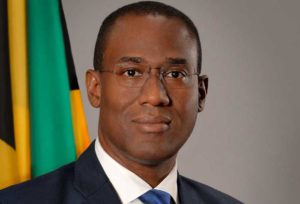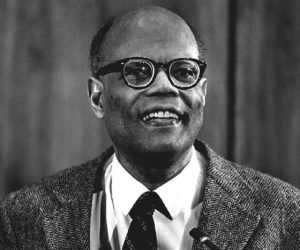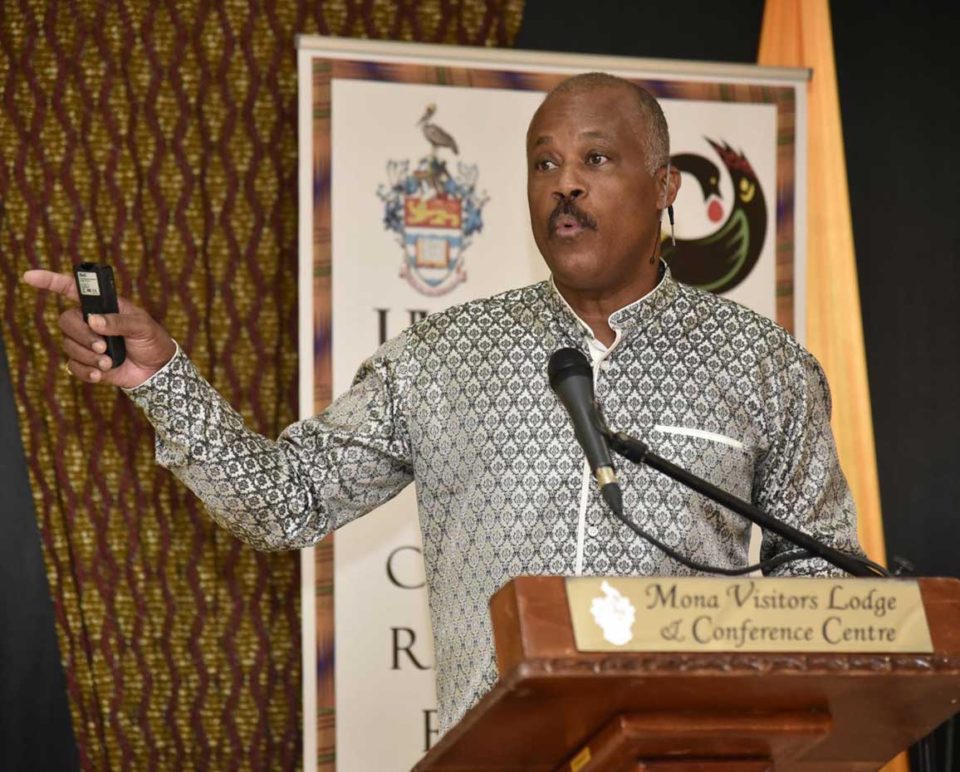“It always seems impossible until it is done”
Nelson Mandela
For the better part of 30 years, Hilary Beckles has been speaking about reparatory justice in the Caribbean and in the world beyond, in an environment where, in his words, “the majority of people are living in a state of profound doubt.” So profound is the doubt, that at times his arguments appear to be more effective in moving the guilty nations of Europe closer to contrition, than in convincing his own people that Reparation is a just cause worth fighting for and that they WILL prevail. “How do we go beyond doubt; how do we imagine the future and how do we do what seems to be impossible?” he asks.
In January 2019 at the invitation of the University of Guyana, Beckles delivered a lecture in Georgetown that we here at jamaicaglobalonline believe is one of the clearest and most profound expositions presented to date on the case for Reparations. Delivered without a written text, a recording of the presentation was transcribed by the Centre for Reparations Research at The UWI from which we now present an edited version
RELINQUISHING DOUBT AND MOVING FORWARD IN THE CONTEXT OF
REPARATIONS
by HILARY McD BECKLES
I want you to imagine the Emancipation Day August 1, 1834, whatever the British called it. How many African people in the Caribbean could have imagined that freedom was going to happen? They have been enslaved for three to four hundred years. How do you imagine that something different would happen if something had been happening for four hundred years? Why would anyone imagine that in a year or two or three that this Emancipation was going to happen after four hundred years? But first of all you have to imagine four hundred years, which I don’t think any of us can imagine an experience for four hundred years and then imagine the change of it. Now in today’s world we would have carried out surveys and opinion polls to find out what the people were thinking, but a decade before the Emancipation Act there was no opinion poll. So if an opinion poll was carried out in 1823 what do you think the Black people would have said? And let’s say the question was- do you think Emancipation is coming? I will venture to say that maybe 90% of the Black people in the Caribbean would have said- “No, it is not gonna happen”; but it did. If you carry out an opinion poll in the Caribbean today and let’s say you ask the Black people today, do you think you will see reparations in your lifetime? I would venture again that 90% of the Black people in the Caribbean would say No.
Do you think you will see reparations in your lifetime? I would venture again that 90% of the Black people in the Caribbean would say No
Why is that; why is it that there was doubt about freedom a few years before Emancipation and why is there doubt about the feasibility of reparations? In fact you can even intervene before and ask yourself in 1940 – do you think that we will become independent? Now, I will venture to say again that in 1940 most people in the Caribbean could not imagine or did not believe that Independence was going to happen in their lifetime, but again it did. So we are often times caught at the crossroads of imagining things that we desire but we are trapped in the pragmatism of reality and if you are optimistic by nature then you would listen to the words of Nelson Mandela – “it always seems impossible until its done” and that is not contradictory; it always seems to be impossible.
Recently I had the privilege of listening to three Jamaican prime ministers speaking about the Jamaican economy :The Hon Edward Seaga, P.J. Patterson and Bruce Golding and they were speaking on the question why is it that in Jamaica the government in the last ten years has done everything correct in terms of the theories and methodologies of economic growth, built upon sound economics and the economy is stubborn and would not grow? Prime Minister Holness had lamented the fact that the economics have been applied with precision, but yet despite the noble effort of his government, despite the tremendous hard work of his cabinet, this stubborn economy would just not grow – 1.5, 1.8%, and then trying to get over the 2% threshold because if you get 2% you might get 3,4% and then the country goes, but until then you are trapped in the under 2% performance. The other prime ministers in response to his frustration commented upon the stubbornness of that economy to give the people of Jamaica what they have long expected. After 40 years the average growth of the Jamaican economy is less than 2%, a country with tremendous resources, very energetic people, magnificent culture, a country that produces global greats when you consider Marcus Garvey, Bob Marley, Usain Bolt – when you consider these phenomenal people this small island produces, these phenomenal world beaters, but yet the stubbornness of the economy. Then at that same forum I listened to Prime Minister Mottley from Barbados who now has the task of taking an economy out of the ditch and putting It back where it had been for the previous 30-40 years. Where and why did it find itself in the ditch? Then I went and I did some research on Trinidad and Tobago that had experienced 5 to 6% growth over 15 years. The 5 to 6 % that Jamaica is pursuing Trinidad had experienced that for fifteen consistent years and at the end of that poverty had increased, inequality had increased and now we are faced with a systemic social crisis of conflict and violence, which will suggest therefore that when we speak about economic growth in these societies we have to speak about something else as well- social growth.
What is social growth? Social growth is the thing that indicates that people are living in a better material and cultural state; they can walk the streets at night; they know that their children will have a better education than they had, that their health is secured and that their material well being is improving from generation to generation and they feel better about themselves as citizens of a society. We call that social growth, and clearly what we now know in our Caribbean countries is that it does not follow that economic growth delivers social growth, so now we have another challenge. Yes, we are all now committed to economic growth and we are all now committed to social growth and there is no mechanical relationship between the two. It is complicated.

Now, the Minister of Finance of Jamaica, Hon Nigel Clarke, one of our young brilliant scholars, first class honours in mathematics at UWI, he goes to Oxford, he is a Rhodes Scholar in economics, he comes back to Jamaica and now he is Minister of Finance and he is giving a lecture on the Mona Campus in celebration of Sir Arthur Lewis. Sir Arthur is undoubtedly the greatest economist that this hemisphere has ever produced and basically what he won his Noble Prize for was showing all us who have been trapped in the plantation economy world for the last three to four hundred years that we can escape it. We can become industrial, we can become technological, we can innovate and we can become modern economies like anywhere else and he suggested the best way how to do this. He was arguably the first economist in the world who was not concerned primarily with sustaining those economies that had already grown. His work was dedicated to imagining the poorest of the poor, the wretched of the earth who had been trapped in colonization. How do we get these people out of colonization into developed economies? But then, the minister stops and was profoundly honest and intellectual in his understanding of Lewis’s theories of economic transformation by declaring that there is volatility in the model. When we ask him to explain, he says the volatility is that three quarters of the people of the Caribbean are trapped in poverty because of historical circumstances. They have inherited poverty and they are trapped in it. Half of our people are living in the ghettos and the majority of the people are living in squalor. When we develop economic models to explain how to grow the economy for direct investment and to attract international capital, you build institutions, you liberate the liquidity in the banking system, you get them to lend so that rich people can take the money and invest in jobs and so on and so forth. What happens to the economics is that the masses of poor people say “we want justice and we want equity” and so the pursuit of economic growth is clearly contradictory from the point of view of a political culture where the majority of people say the number one priority for us is justice and equity, and here is a brilliant young finance minister with a good heart and a brilliant mind trying to create this cohesion between what economics is saying we must do and what sociology is saying “Oh my God look at the people, we must help the people”. And so if you spend too much money on the education of the poor people, housing, health, education etc. that is money that should be invested in agriculture and manufacturing and production, so it’s choice. No government in the Caribbean has been able as yet to remove Nigel Clarke’s volatility in the model, and so if you invest in the poor it is called socialism and the capitalists say no way will we support socialism, and if you invest in the rich to empower them, the poor says this is bourgeois anti-working class economics and we go left right, left right in search of the removal of the volatility.

Now all of this is about reparations but nobody calls it that as yet. It is all about how do you repair the damage that has been done to the majority of the people of the Caribbean and empower them to move forward. But while the majority of the people in the Caribbean are demanding social justice, equity, are demanding economic empowerment – the right to participate in their economy, the right to own their economy which is all what reparations is – most people in the Caribbean do not call that reparations. In fact they will say to you “I don’t believe in reparations”. Here is the contradiction. Most people will say I do not believe that we should waste our time with this reparations nonsense but yet everything they aspire to, everything they want and desire IS about reparations and hence we have this systemic anomaly which we have to get rid of.
But to repair is not simply economics; you don’t simply repair the harm that is done to you by making money. How about the psychological aspects of repairing? How many people of African and Indian descent are still ashamed of their blackness? How many people of African and Asian descent still see blackness or even brownness as a limitation to their achievements in their own country? We still have these challenges. The majority of our people would much prefer to live freely and equally in justice with equity but there are things in our societies that are preventing this from happening.
But to repair is not simply economics; you don’t simply repair the harm that is done to you by making money. How about the psychological aspects of repairing?
A Historian’s View
- It took all of the 19th century to eradicate slavery from the modern world, one hundred years from the beginning with the Haitians in 1804 abolishing slavery forever and ever to 1888 in Brazil. It took one hundred years to uproot it and get it out of our moral world, uprooting this evil.
- Then the 20th century – another one hundred years to get rid of indentureship, to get the right to vote, the right to have trade unions, to educated our children, civil rights movement, Independence; it took all of the 20th century to get those fundamental civil and human rights.
- And now we have a long 21st century in front of us and I am saying to you that the greatest movement in the world in the 21st century is going to be the reparations movement.
Our former colonial masters say “Let us move on”; and guess what I will say, that maybe half the people of the Caribbean, maybe three quarters of the people have been uttering their language, “Oh it was a long time ago let us move on”. And guess what I have heard and seen people living in abject poverty in the Caribbean, who have never had a job, whose children are illiterate or semi-literate. It was the same for their parents and grandparents going back a hundred years. And I have heard these same people saying “Oh this history thing let’s forget it and move on”. In other words your neck is in a noose and you’re saying to the hangman “hey brother what’s happening? Why don’t you get on with it and let’s have a drink” and your neck is in the noose and you don’t seem to realize that there is a relationship between the noose and the person who is going to pull it. But that is the nature of our history and it happens to all of us.
Reparations is not about standing on street corners and asking for handouts.
Reparations is not about standing on street corners and asking for handouts. It is not about subjecting yourself to any indignity of asking people to give you money based on a theory that has emerged out of Europe – “Oh reparations, I know what they mean. Reparations mean those lazy Black people in the Caribbean want money from us”. That’s how they interpret it and then we believe it. But we’ve walked this road before. When Martin Luther King said to the American nation we need to integrate this nation so that all of us can benefit from this development. He knew what he meant- better schools for everyone, housing for everyone, he wanted all the people to remove the racial discrimination, let the people of America live as one nation. But the media said, “Ok, what he means by integration is that black men are going to marry white women” and then the forces began to galvanize around Martin Luther King to destroy him because that is how they determined what integration meant, we knew what it meant, they defined it for us and they destroyed Martin Luther King.
 We are defining reparations; reparations is about our development. It is about why there all of those poor children semi-literate in ghettos in this Caribbean; why there are still some places that we can’t live in the Caribbean and we are the majority and why is it that we have all of these chronic diseases. There is a pandemic throughout Caribbean people where 60% of the Black people in the Caribbean have hypertension or diabetes because for three hundred years you were told eat what you grow, and thus we are now in the circumstance where our bodies cannot metabolize salt and sugar because for three hundred years every single day morning, noon and night we’re eating sugar and salt – the only people in the world consigned to that fate. I know this because walking to primary school, barefooted, our grandmother would give us a little half a pound bag of sugar and when you were hungry you ate sugar as a meal. But that was the nature of all the poor people on the island. And now Barbados is called the amputation capital of the world because there is more amputation of limbs of Black people in Barbados per capital anywhere in the world and why? Because Barbados was an island of pure sugar production, 80% of the land space of Barbados was sugar and the people ate sugar morning, noon and night and now it is the amputation capital. So on the one hand you have the beautiful beaches and on the other hand we are losing our limbs every day and you have to connect all of that. Where is the volatility? If you cannot connect that, we academics are failing in our jobs. And it is an important matter; it is about health. Reparations is about your health. It is also about why you don’t have a museum in your society dedicated to your history. You can’t take your kids down to Georgetown and say we have a museum to show the history of slavery and indenture, you don’t have that. But there is one in Manchester, Liverpool, Bristol and London. But you are the one who went through slavery and indenture and you don’t have one and it exists elsewhere. There are Rastafarians in our Caribbean who have said “We want to go home. We are stolen people, stolen people have a right to return from whence they came”. Who is going to fund the restitution of people’s right to be taken to the place from where they were stolen and kidnapped? I was in Ethiopia last year, in Chechaman, I visited there and there is about 25,000 West Indians there who have returned, they had to spend all of their money and savings to go home. There are now ten governments in Africa who have said “If you want to come, come. We’ll give you a piece of land, we’ll give you citizenship, come”. So the governments of Africa have now opened up Africa for those of you who want to go home. But why should you have to fund that? Why should you have to pay the return ticket when you didn’t pay the first ticket? These are the issues that are important to all of us going forward. And I want to tell my brothers of Indian ancestry in this audience that the fastest growing group of diabetics citizens in the Caribbean are Indian men. They will want to tell you that it’s the rice, flour, carbohydrates your consuming, that your diet is too filled with carbohydrates or sugar, but it is much more than that. So I am saying to you all of us whether we are African or from India, we have a reason to support the reparations movement because it is about improving our well being as a people and taking care of the well being of our children going forward. So it is an ethical issue. And it is not simply economic development will take care of it. No, you need social development.
We are defining reparations; reparations is about our development. It is about why there all of those poor children semi-literate in ghettos in this Caribbean; why there are still some places that we can’t live in the Caribbean and we are the majority and why is it that we have all of these chronic diseases. There is a pandemic throughout Caribbean people where 60% of the Black people in the Caribbean have hypertension or diabetes because for three hundred years you were told eat what you grow, and thus we are now in the circumstance where our bodies cannot metabolize salt and sugar because for three hundred years every single day morning, noon and night we’re eating sugar and salt – the only people in the world consigned to that fate. I know this because walking to primary school, barefooted, our grandmother would give us a little half a pound bag of sugar and when you were hungry you ate sugar as a meal. But that was the nature of all the poor people on the island. And now Barbados is called the amputation capital of the world because there is more amputation of limbs of Black people in Barbados per capital anywhere in the world and why? Because Barbados was an island of pure sugar production, 80% of the land space of Barbados was sugar and the people ate sugar morning, noon and night and now it is the amputation capital. So on the one hand you have the beautiful beaches and on the other hand we are losing our limbs every day and you have to connect all of that. Where is the volatility? If you cannot connect that, we academics are failing in our jobs. And it is an important matter; it is about health. Reparations is about your health. It is also about why you don’t have a museum in your society dedicated to your history. You can’t take your kids down to Georgetown and say we have a museum to show the history of slavery and indenture, you don’t have that. But there is one in Manchester, Liverpool, Bristol and London. But you are the one who went through slavery and indenture and you don’t have one and it exists elsewhere. There are Rastafarians in our Caribbean who have said “We want to go home. We are stolen people, stolen people have a right to return from whence they came”. Who is going to fund the restitution of people’s right to be taken to the place from where they were stolen and kidnapped? I was in Ethiopia last year, in Chechaman, I visited there and there is about 25,000 West Indians there who have returned, they had to spend all of their money and savings to go home. There are now ten governments in Africa who have said “If you want to come, come. We’ll give you a piece of land, we’ll give you citizenship, come”. So the governments of Africa have now opened up Africa for those of you who want to go home. But why should you have to fund that? Why should you have to pay the return ticket when you didn’t pay the first ticket? These are the issues that are important to all of us going forward. And I want to tell my brothers of Indian ancestry in this audience that the fastest growing group of diabetics citizens in the Caribbean are Indian men. They will want to tell you that it’s the rice, flour, carbohydrates your consuming, that your diet is too filled with carbohydrates or sugar, but it is much more than that. So I am saying to you all of us whether we are African or from India, we have a reason to support the reparations movement because it is about improving our well being as a people and taking care of the well being of our children going forward. So it is an ethical issue. And it is not simply economic development will take care of it. No, you need social development.



2 comments
I am so grateful to Sir Hilary Beclkes for this lecture. Things are making sense. I understand so much more. Thank you.
Glynne Manley
Ian–Thanks f0r posting this excellent piece by Prof. Sir Hilary Beckles, chairman of the CARICOM Reparations Commission (CRC). Hopefully, it will contribute to deepening the understanding of reparatory justice and broaden the public discourse both in Jamaica and in the diaspora on the subject of reparations for African slavery and indigenous genocide throughout the Americas.
Keep up the great work!!
Don Rojas
Comments are closed.